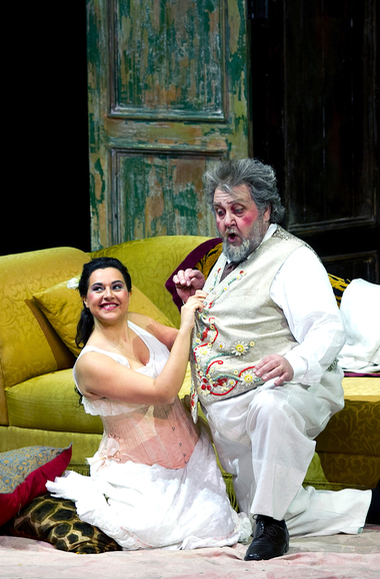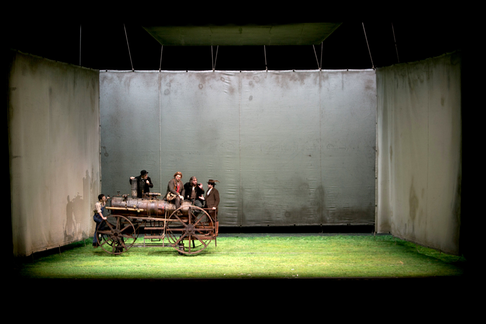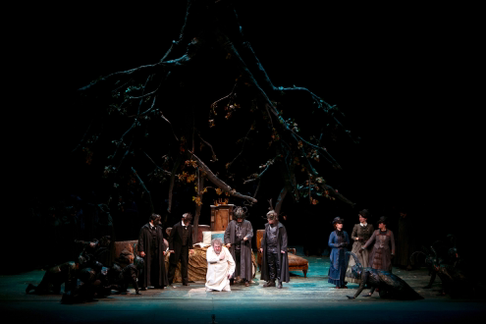Recently in Reviews
English Touring Opera are delighted to announce a season of lyric monodramas to tour nationally from October to December. The season features music for solo singer and piano by Argento, Britten, Tippett and Shostakovich with a bold and inventive approach to making opera during social distancing.
This tenth of ten Live from London concerts was in fact a recorded live performance from California. It was no less enjoyable for that, and it was also uplifting to learn that this wasn’t in fact the ‘last’ LfL event that we will be able to enjoy, courtesy of VOCES8 and their fellow vocal ensembles (more below …).
Ever since Wigmore Hall announced their superb series of autumn concerts, all streamed live and available free of charge, I’d been looking forward to this song recital by Ian Bostridge and Imogen Cooper.
The Sixteen continues its exploration of Henry Purcell’s Welcome Songs for Charles II. As with Robert King’s pioneering Purcell series begun over thirty years ago for Hyperion, Harry Christophers is recording two Welcome Songs per disc.
Although Stile Antico’s programme article for their Live from London recital introduced their selection from the many treasures of the English Renaissance in the context of the theological debates and upheavals of the Tudor and Elizabethan years, their performance was more evocative of private chamber music than of public liturgy.
In February this year, Albanian soprano Ermonela Jaho made a highly lauded debut recital at Wigmore Hall - a concert which both celebrated Opera Rara’s 50th anniversary and honoured the career of the Italian soprano Rosina Storchio (1872-1945), the star of verismo who created the title roles in Leoncavallo’s La bohème and Zazà, Mascagni’s Lodoletta and Puccini’s Madama Butterfly.
Evidently, face masks don’t stifle appreciative “Bravo!”s. And, reducing audience numbers doesn’t lower the volume of such acclamations. For, the audience at Wigmore Hall gave soprano Elizabeth Llewellyn and pianist Simon Lepper a greatly deserved warm reception and hearty response following this lunchtime recital of late-Romantic song.
Collapsology. Or, perhaps we should use the French word ‘Collapsologie’ because this is a transdisciplinary idea pretty much advocated by a series of French theorists - and apparently, mostly French theorists. It in essence focuses on the imminent collapse of modern society and all its layers - a series of escalating crises on a global scale: environmental, economic, geopolitical, governmental; the list is extensive.
For this week’s Live from London vocal recital we moved from the home of VOCES8, St Anne and St Agnes in the City of London, to Kings Place, where The Sixteen - who have been associate artists at the venue for some time - presented a programme of music and words bound together by the theme of ‘reflection’.
'Such is your divine Disposation that both you excellently understand, and royally entertaine the Exercise of Musicke.’
Amongst an avalanche of new Mahler recordings appearing at the moment (Das Lied von der Erde seems to be the most favoured, with three) this 1991 Mahler Second from the 2nd Kassel MahlerFest is one of the more interesting releases.
‘And there was war in heaven: Michael and his angels fought against the dragon; and the dragon fought and his angels, And prevailed not; neither was their place found any more in heaven … that old serpent … Satan, which deceiveth the whole world: he was cast out into the earth, and his angels were cast out with him.’
If there is one myth, it seems believed by some people today, that probably needs shattering it is that post-war recordings or performances of Wagner operas were always of exceptional quality. This 1949 Hamburg Tristan und Isolde is one of those recordings - though quite who is to blame for its many problems takes quite some unearthing.
There was never any doubt that the fifth of the twelve Met Stars Live in Concert broadcasts was going to be a palpably intense and vivid event, as well as a musically stunning and theatrically enervating experience.
‘Love’ was the theme for this Live from London performance by Apollo5. Given the complexity and diversity of that human emotion, and Apollo5’s reputation for versatility and diverse repertoire, ranging from Renaissance choral music to jazz, from contemporary classical works to popular song, it was no surprise that their programme spanned 500 years and several musical styles.
The Academy of St Martin in the Fields have titled their autumn series of eight concerts - which are taking place at 5pm and 7.30pm on two Saturdays each month at their home venue in Trafalgar Square, and being filmed for streaming the following Thursday - ‘re:connect’.
The London Symphony Orchestra opened their Autumn 2020 season with a homage to Oliver Knussen, who died at the age of 66 in July 2018. The programme traced a national musical lineage through the twentieth century, from Britten to Knussen, on to Mark-Anthony Turnage, and entwining the LSO and Rattle too.
With the Live from London digital vocal festival entering the second half of the series, the festival’s host, VOCES8, returned to their home at St Annes and St Agnes in the City of London to present a sequence of ‘Choral Dances’ - vocal music inspired by dance, embracing diverse genres from the Renaissance madrigal to swing jazz.
Just a few unison string wriggles from the opening of Mozart’s overture to Le nozze di Figaro are enough to make any opera-lover perch on the edge of their seat, in excited anticipation of the drama in music to come, so there could be no other curtain-raiser for this Gala Concert at the Royal Opera House, the latest instalment from ‘their House’ to ‘our houses’.
"Before the ending of the day, creator of all things, we pray that, with your accustomed mercy, you may watch over us."
Reviews

30 Jan 2017
Falstaff in Genoa
A Falstaff that raised-the-bar ever higher, this was a posthumous resurrection of Luca Ronconi’s masterful staging of Verdi’s last opera, the third from last of the 83 operas Ronconi staged during his lifetime (1933-2015). And his third staging of Falstaff following Salzburg in 1993 and Florence in 2006.
Both earlier productions designed by his long time operatic scenic collaborator Margarita Palli.
This Luca Ronconi Falstaff production was first seen in Bari in 2013 (then in Naples and Florence). It is designed by Tiziano Santi, normally a collaborator in Ronconi’s non-operatic theater projects. Santi’s set is nothing more than walls of blank canvases, including the show curtain itself, against which walls Verdi’s gigantic comedy takes place. It is minimalist staging, the scenes traveling presentationally back and forth across downstage. Finally it was a purely verbal Falstaff, staged so the we heard every word uttered both by the voice on the stage and by Verdi’s orchestra in the pit. And we clearly saw every word lived by the opera’s protagonists.
29 year-old, wunderkind conductor Andrea Battistoni was in the pit engaging the hyper alive Genoa orchestra with the stage, magnifying the “Falstaff immenso! enorme Falstaff!” announced by Sir John Falstaff into monumental proportion, driving the punctuating cadences to every last one of Verdi’s intended exclamation points, delighting in the sweet, fleeting encounters of the young lovers, encouraging the female chatter and indulging the Italian male cuckold fetish to its absolute maximum. It was a conducting tour de force, sparks still flying from the tip of his baton (stick still in-hand) at his stage bow.
 Ford's tractor, Fenton extreme left, Ford in hat with feather extreme right
Ford's tractor, Fenton extreme left, Ford in hat with feather extreme right
The Genoa cast of January 28 found a distinctly Mediterranean bias for Ronconi’s simple English farm life — The Italiano Alberto Mastromarino as Falstaff, Brazilian born, Spain finished baritone Rodrigo Esteves as Ford, Serbian born and trained Nenad Čiča as Fenton, Livorno born Valentina Boi as Alice. Plus two Russian born artists who have become Italian artists — Anastasia Boldyreva as Dame Quickly and Daria Kovalenko as Nanetta. Add to these the bevy of Italian male buffo character roles that were plumbed to perfection in the inimitable Italian buffo tradition.
Interestingly this was the second cast, singing two of the five performances, but you could not imagine or wish for more finished performances. Sir John Falstaff was of believable girth, of quick spirit and of powerful voice. You could, for moments from time to time, even believe that this Falstaff was an honest predator and not simply a caricature of delusion. He quibbled with Ford as an equal, triggering Rodrigo Estives, a very smart-looking, too handsome farmer, to go-off-the-deep-end in forceful hyper-baritonal terms. Note that the Ford disguise was dark glasses and, wittily, a pillow stuffed under his jacket to add girth. Fenton was dressed in bibbed denim trousers, the classic piece-of-straw chewin’ farm hand, tenor Nenad Čiča’s “Dal labro il canto estasiato vola” exquisitely wrought in tenorial flight.
The Alice Ford of Valentina Boi was ever so slightly maternal, her ample lyric voice buoying the fracas of female voices in Ronconi’s barnyard (sketched by nothing more than four geese in a line), pedaling on and off on fantastical antique bicycles with her daughter, Nanetta, sung by Daria Kovalenko in her little-girl operetta-like voice. Anastasia Boldyreva found the richness of tone to vocally convey Verdi’s satiric Quickly, yet it was the voice of a real woman (and gratefully not a cameo appearance by a famous over-the-hill diva). Meg Page did what she always does — stayed out of the way except when needed.
 The upside down oak tree
The upside down oak tree
It was perfect theater, well until Act III when the Herne, the Hunter’s Oak inexpicably flew in upside down and dramatically the carefully entwined threads lost direction. Focus was further diluted by Nanetta’s anemic delivery of “Sul fil d’un soffio etesio.” It is possible that the slight musical insecurities inherent to a second cast noticed throughout the evening became more pronounced. We were left musically and dramatically adrift until finally the 10 protagonists walked across the stage apron to sit on the lip and deliver Falstaff’s immense and enormous fugue “Tutto nel mondo è burla, l’uomo è nato burlone” directly under the conductor’s baton. It was indeed Verdi’s 10 voiced fugal joke as never before, his response maybe to Wagner’s 50 voiced Meistersinger riot and certainly a bit of well-meaning one-upmanship to the great ensembles of Rossini himself.
Michael Milenski
Cast and production information:
Sir John Falstaff: Alberto Mastromarino; Ford: Rodrigo Esteves; Fenton: Nenad Čiča; Dottor Cajus: Cristiano Olivieri; Bardolfo: Marcello Nardis; Pistola: Mihailo Šljivić; Mrs. Alice Ford: Valentina Boi; Nannetta: Daria Kovalenko; Mrs. Quickly: Anastasia Boldyreva; Mrs. Meg Page: Manuela Custer. Chorus and Orchestra of the Teatro Carlo Felice. Conductor: Andrea Battistoni; Production: Luca Ronconi; Stage Director: Marina Bianchi; Scenery: Tiziano Santi; Lighting: A. J. Weissbard. Teatro Carlo Felice, Genoa, Italy, January 28, 2016.


